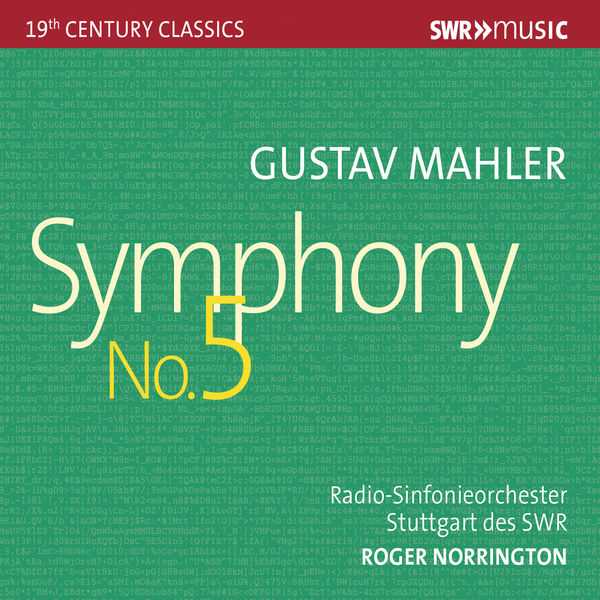
Composer: Gustav Mahler
Orchestra: Radio-Sinfonieorchester Stuttgart des SWR
Conductor: Sir Roger Norrington
Format: FLAC (tracks)
Label: SWR Music
Catalogue: SWR19517
Release: 2019
Size: 305 MB
Recovery: +3%
Scan: cover
Symphony No. 5
01. I. Trauermarsch
02. II. Stürmisch bewegt, mit größter Vehemenz
03. III. Scherzo
04. IV. Adagietto
05. V. Rondo – Finale
This re-release of the SWR bestseller 93.165 is published on the occasion of Sir Roger Norrington’s 85th birthday in March 2019. This recording gives testimony of Norrington’s specific ‘Stuttgart Sound’ and contains one of the best-known symphonies by Gustav Mahler.
Initially, Roger Norrington established himself as an advocate for authentic performance practices in early music through recordings of works from the Baroque to the Classical periods. In this live 2006 performance of Gustav Mahler’s Symphony No. 5 in C sharp minor with the SWR Symphony Orchestra of Stuttgart, Norrington widens his antiquarian role and attempts to re-create the practices of the early twentieth century — following known seating arrangements, using the size of orchestra indicated in the score, playing instruments with little vibrato, and so on — all to a curious result. This is not too far off from mainstream performances of the work we hear today, except that Norrington manages to make the piece feel sanitized and clinical, or so it will seem to listeners whose tastes were developed from hearing Leonard Bernstein’s or Georg Solti’s passionate recordings; and even those who cut their teeth listening to Benjamin Zander’s or Claudio Abbado’s historically informed but compelling renditions will find Norrington’s interpretation to be mechanical, stiff, fussy, and mostly uninteresting. This beloved symphony is one of Mahler’s most emotionally turbulent and gripping works, and we expect the “Trauermarsch” to be devastating, the “Stürmisch bewegt” to be gut wrenching, the Scherzo to be vigorous and muscular, the Adagietto to be rapturous, and the Rondo-Finale to be ecstatically joyous; but nothing close to these ideals is achieved under Norrington’s baton. What comes across is a peculiarly detached, even deadpan, reading, as if all it took to bring off Mahler’s Fifth were meticulous details, strictly counted beats, and a scrupulous accounting for every note. Nowhere does Norrington’s performance transcend the printed page and reach for the heart, and he misses what makes Mahler matter. So this recording is reasonable to use when studying the score, but don’t let it be the only one you ever hear or own: this great work deserves much better than that.



